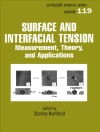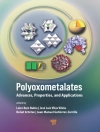Polysaccharide nanocrystals, an emerging green nanoingredient (nanomaterial) with high crystallinity obtained by acid hydrolysis of biomass-based polysaccharides, are of scientific and economic significance owing to their abundance, biodegradation potential, and fascinating functional performance. This versatile class of materials can be used in nanocomposites such as rubber or polyester, and in functional materials such as drug carriers, bio-inspired mechanically adaptive materials or membranes, to name but a few.
This book encompasses the extraction, structure, properties, surface modification, theory, and mechanism of diverse functional systems derived from polysaccharide nanocrystals.
This highly sought-after trendy book is currently the only monograph devoted to the most current knowledge pertaining to this exciting subject area. It is ideal for researchers and stakeholders who wish to broaden and deepen their knowledge in the fast-moving and rapidly expanding R&D field of polymeric materials.
विषयसूची
Preface
POLYSACCHARIDE NANOCRYSTALS: CURRENT STATUS AND PROSPECTS IN MATERIAL SCIENCE
Introduction to Polysaccharide Nanocrystals
Current Application of Polysaccharide Nanocrystals in Material Science
Prospects for Polysaccharide Nanocrystal-Based Materials
STRUCTURE AND PROPERTIES OF POLYSACCHARIDE NANOCRYSTALS
Introduction
Cellulose Nanocrystals
Chitin Nanocrystals
Starch Nanocrystals
Conclusion and Prospects
SURFACE MODIFICATION OF POLYSACCHARIDE NANOCRYSTALS
Introduction
Surface Chemistry of Polysaccharide Nanocrystals
Approaches and Strategies for Surface Modification
Adsorption of Surfactant
Hydrophobic Groups Resulting from Chemical Derivatization
Polymeric Chains from Physical Absorption or Chemical Grafting
Advanced Functional Groups and Modification
Concluding Remarks
PREPARATION OF POLYSACCHARIDE NANOCRYSTAL-BASED NANOCOMPOSITES
Introduction
Casting/Evaporation Processing
Thermoprocessing Methods
Preparation of Nanofibers by Electrospinning Technology
Sol-Gel Method
Self-Assembly Method
Other Methods and Prospects
POLYSACCHARIDE NANOCRYSTAL-REINFORCED NANOCOMPOSITES
Introduction
Rubber-Based Nanocomposites
Polyolefin-Based Nanocomposites
Polyurethane and Waterborne Polyurethane-Based Nanocomposites
Polyester-Based Nanocomposites
Starch-Based Nanocomposites
Protein-Based Nanocomposites
Concluding Remarks
POLYSACCHARIDE NANOCRYSTALS-BASED MATERIALS FOR ADVANCED APPLICATIONS
Introduction
Surface Characteristics Induced Functional Nanomaterials
Nano-Reinforcing Effects in Functional Nanomaterials
Optical Materials Derived from Liquid Crystalline Property
Special Films and Systems Ascribed to Barrier Property
Other Functional Applications
Concluding Remarks
CHARACTERIZATION OF POLYSACCHARIDE NANOCRYSTAL-BASED MATERIALS
Introduction
Mechanical Properties of Polysaccharide Nanocrystals
Dispersion of Polysaccharide Nanocrystals
Mechanical Properties of Polysaccharide Nanocrystal-Based Materials
Polysaccharide Nanocrystal/Matrix Interfacial Interactions
Thermal Properties of Polysaccharide Nanocrystal-Based Materials
Barrier Properties of Polysacharide Nanocrystal-Based Materials
Concluding Remarks
Index
लेखक के बारे में
Prof. Dr. Jin Huang is affiliated with College of Chemistry, Chemical Engineering and Life Science, Wuhan University of Technology, China. He received the Ph D from College of Chemistry and Molecular Sciences, Wuhan University, China. His research interest focuses on ‘Developing chemical and physical methodology and technologies to manufacturing green materials from biomass resources’. He has worked on the preparation and evaluation of bioplastics, composites and nanocomposites using natural polymers including cellulose, chitin and chitosan, starch, plant proteins etc., and explored some advanced applications in biomedical field. Up to now, he has authored and co-authored more than 100 peer-reviewed journal publications (h-index of 24), 7 book chapters, over 40 granted patents, and many conference papers/presentations.
Prof. Dr. Chang is affiliated with Agriculture and Agri-Food Canada/Government of Canada, and with the Department of Chemical and Biological Engineering, University of Saskatchewan, Canada. His research interests focus on ‘developing new opportunities from bio-resources for supporting a robust and vibrant bioeconomy’. He works on the characterization and processing of biopolymers from agricultural/biomass production, and devising functional systems (bioplastics, biocomposites, nanocomposites, biomaterials etc.) and other industrial products. Prior to his current postings, Dr. Chang worked 15 years for several consulting firms which offered practical solutions to domestic and international companies in the agri-food and bio-resource industries. He has authored 120+ peer-reviewed papers (h-index of 29), 90+ technology transfer contract reports to industry, many authoritative reviews and book chapters, four granted patents, and numerous conference papers/presentations.
Dr. Ning Lin received his Ph D at the International School of Paper, Print Media and Biomaterials (Pagora) in Grenoble Institute of Technology, France. Currently, he is conducting postdoctoral research in Université Joseph Fourier and Grenoble Institute of Technology, France. He has authored 14 scientific publications, 4 book chapters and 2 patents. His research interests include chemical modification, design and development of nanocomposite, and functional application based on biomass nanoparticles.
Professor Dr. Alan Dufresne is affiliated with The International School of Paper, Print Media and Biomaterials (Pagora) at Grenoble Institute of Technology, France. He received his Ph D in 1991 from the Department of Electronic at the Toulouse National Institute of Applied Science. His main research interests concern the processing and characterization of polymer nanocomposites reinforced with nanoparticles extracted from renewable resources. He has authored and co-authored more than 200 scientific publications (h-index of 58) and 38 book chapters, as well as a monograph on nanocellulose in 2012. He was invited professor at Universidade Federal de Rio de Janeiro (UFRJ) (Brazil) and Universiti Kebangsaan Malaysia (UKM) (Malaysia).












